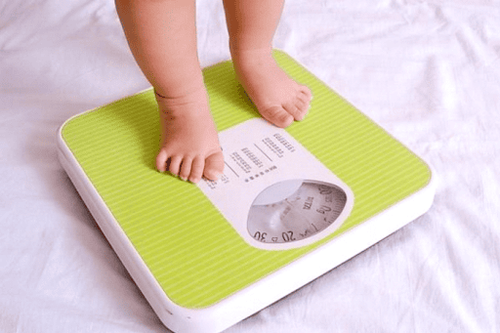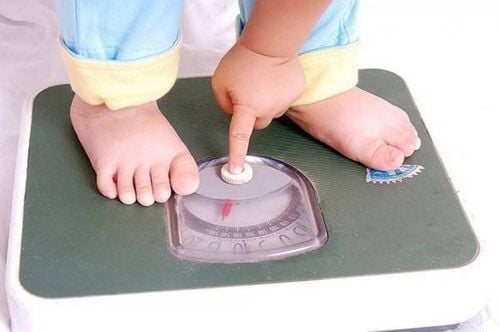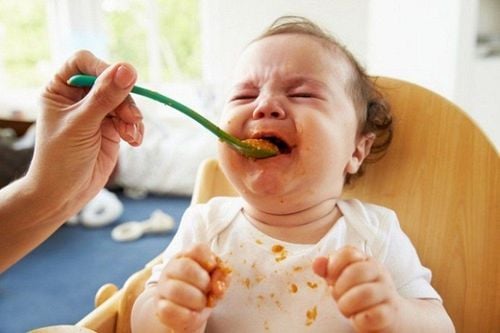This is an automatically translated article.
Anorexia is a condition in which a child's appetite is reduced or lost, which prevents a child from getting the required amount of food. Anorexia is manifested with many different levels, children may eat less than usual, or only eat very little of some foods or worse, children are afraid to eat and vomit when they see food.
1. Is the child's fear of eating due to a psychological problem?
There are many different causes of anorexia in children. Physiological changes such as developmental stages, teething babies can be anorexic. Young children often have poor resistance, so they are prone to diseases such as: gingivitis, pharyngitis, tonsillitis, bronchitis, pneumonia, diarrhea all make children refuse to eat or eat less.
Some other reasons for children to be anorexic such as children being cared for and pampered too much or because their parents are too busy with work or often have to travel far away, have little time to take care of them.
These psychological factors will make children sulky and emotional, leading to stop eating. Especially the behavior of adults such as yelling, threatening or family quarrels and conflicts all affect children.
If you force your child to eat when he doesn't want to eat, it can also make him afraid of eating or vomiting. This has a negative effect on children, children will form a fear of eating, the treatment of this condition is not simple.
Children can also stop eating if the food is not suitable for their age or mistakes in food preparation such as: Using bone broths, too much protein or many hard vegetables will affect affect the digestive system of children.
2. What are the consequences of children refusing to eat?
When refusing to eat will cause children to gain weight slowly, if there is no timely intervention, children will suffer from mild to severe malnutrition. The resistance of malnourished children also decreases, making them more susceptible to diseases, then the children become more anorexic. Becoming an extremely dangerous pathological spiral, it is necessary to have timely intervention measures to help children maintain activity and development.
If children suffer from severe and prolonged malnutrition, it will affect the growth of height. Children are at risk of stunting with short stature and the recovery process will be more difficult and prolonged.

Trẻ sợ ăn có thể dẫn đến hậu quả chậm tăng cân
3. Children afraid to eat what to do?
“The baby is afraid of what to do” is the question of many parents who have children in this condition. Accordingly, if your child is afraid of eating or anorexic, you should create a happy and excited atmosphere while feeding them, and prepare foods with a variety of types, colors and flavors to attract them. Encourage and encourage children to eat together.
You should sit close to encourage children to eat actively. You can also increase the enjoyment of eating through games or stories your child loves.
Some measures to increase the energy of the child's diet:
Even though the child eats a small amount of food, he will not lose weight if you add 1 tablespoon of fat (oil, fat) to each meal or divided Eat food in small meals at different times rather than having to eat all the servings at once. It is recommended to add nutritious foods after the main meal such as: Yogurt, flan, cheese also help provide significant energy. Children should eat foods they like because in certain periods of time they will especially like certain foods. Because you are often afraid that your child won't get enough nutrients, so often force them to eat other foods, prohibition sometimes creates a protest reaction in the child. Things you should avoid when your child is anorexic:
Do not let your child eat sweets or drink soft drinks before the main meal. When the child is afraid of eating, anorexia, avoid stress, scold or hit the child. Do not force the child to eat in any way, including forcing the child to put food in his mouth. Do not arbitrarily give medicine to children because the correct cause of anorexia must be known for the drug to work, otherwise it may make the child anorexic. Time for children to eat should not last more than 30 minutes. Children should not be given foods that they have vomited while eating. In some cases, children often vomit because they eat too much, so do not force children when they do not want to eat more. Absolutely should not let children eat and play at the same time or eat while watching phones, TV, ... because this will reduce the ability to recognize foods and affect the functioning of the digestive system in children. . Currently, there is no drug that is considered safe to treat anorexia in children. However, you can use vitamin and mineral supplements for malnourished children to help increase metabolic activity in the body or use digestive enzymes to help support digestion and digestion. eat.
Anorexia is a complex problem, can have many causes, and affects the nutritional status of children. Risk factors for anorexia in children need to be identified and eliminated. The treatment of anorexia in young children requires a combination of measures, attention and patience of caregivers.
In the case of children who are afraid of psychological eating, they need to be treated by a psychologist. The treatment will take a long time, so it needs the cooperation of the doctor, family and school.
4. Important rules for children to eat well
In order for children to eat well, parents need to follow the following principles:
Feed children age-appropriate foods: Babies should be exclusively breastfed for the first 6 months to improve their resistance to disease. young. Children 6 months and older should be introduced to weaning foods with the necessary foods as recommended by a nutritionist. You should give your child all 4 essential nutrients, including carbohydrates, proteins, fats, and foods that provide vitamins and minerals from green vegetables as well as fresh fruits. Children from 8 to 12 months old, you should practice giving them solid foods such as porridge, vermicelli, pho, or crushed rice... so that they can develop the ability to chew.

Cho trẻ ăn theo nguyên tắc phù hợp với lứa tuổi sẽ góp phần khắc phục tình trạng trẻ sợ ăn
Do not force children to eat too much: Parents who want the baby to gain weight well and want the baby to be chubby are healthy and beautiful babies. However, this job is very easy to make children afraid of eating, leading to anorexia nervosa, difficult to treat. Instead, you should feed your child according to his or her ability, letting him choose the foods he likes. For children who have difficulty eating, you should divide them into many small meals to help them eat enough food without causing the child's digestive system to be overloaded. You should limit your children to eat foods that are processed quickly (fast food) or contain a lot of sugar such as hamburgers, pizza, french fries, fried chicken, soft drinks, sweets, chocolate... Instead In addition, you should choose foods that are beneficial to the health of children such as encouraging children to eat more green vegetables, fresh fruits and add enough water for the body to ensure health and easy digestion.
Encourage children to increase physical activity: Children who are physically active have a flexible body and their eating also becomes easier as a result. Because when children move a lot, they will be hungry faster and have a better appetite, every day should encourage children to be physically active for about 30 minutes with age-appropriate activities such as cycling. , playing soccer in the yard, swimming, walking with parents... With older children, children should be encouraged to participate in kitchen chores with their parents, both creating conditions for children to exercise and an opportunity to help. Children understand more about the nutritional value of food, through which dogs can make children more interested in eating.
Create a happy family atmosphere in children's meals: You should maintain a family meal atmosphere with your children, let them gradually practice eating skills such as teaching children to hold spoons and chopsticks, let them know eat by themselves, practice communication skills at the table with adults... Many scientific studies have proven that when children eat together with their family in a warm atmosphere, children often eat more. , and help develop the senses and brain in the best way.
For children to sit in the correct posture when eating: This helps the child's digestive system work best, you should choose for your child an upright chair with a backrest, the chair must be level with the position to foods that children can eat easily. Choosing the right seat will help your child's digestive organs expand to the maximum, making food quickly digested and absorbed, helping children avoid troubles such as gas, bloating or confusion. digestive disorders. In short, when refusing to eat will make children slow to gain weight, if there is no timely intervention, children will suffer from mild to severe malnutrition. If children suffer from severe and prolonged malnutrition, it will affect their development. Therefore, if the child is afraid of eating, anorexic, you should create a happy and excited atmosphere while feeding; prepare food in a variety of types, colors and flavors to attract children.
Besides, the baby needs to add the necessary micronutrients: Zinc, selenium, chromium, vitamins B1 and B6, ginger, acerola fruit extract (vitamin C), ... to improve taste, eat delicious , reach the right height and weight and exceed the standard, have a good immune system, strengthen the resistance to get sick less often and have less digestive problems.
The improvement of symptoms can take place for a long time, so it is recommended that parents be calm and persistent when supplementing with nutrients for children, even through eating or functional foods. In particular, the use of functional foods should choose those of natural origin that are easily absorbed, do not allow simultaneous use of many types or continuously change the types of functional foods.
For more nutritional knowledge and child care for each age, parents should regularly visit the website vimec.com and make an appointment with the leading doctors, pediatric and nutrition experts of the National General Hospital. Vinmec when needing advice on children's health.













